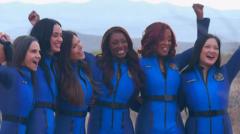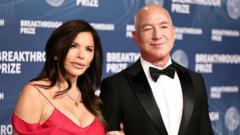In a groundbreaking moment for space tourism and gender representation, Blue Origin's New Shepard rocket successfully launched an all-female crew into the sky, marking a rare occasion in the annals of aerospace history. The six women, led by pop sensation Katy Perry, included notable figures such as Lauren Sánchez, Gayle King, former NASA scientist Aisha Bowe, civil rights activist Amanda Nguyen, and producer Kerianne Flynn.
The mission commenced from Blue Origin's West Texas launch site around 08:30 local time, propelling the crew more than 100 kilometers above Earth for roughly 11 minutes of joy and weightlessness. Upon the capsule's return to Earth, emotional celebrations erupted as crew members expressed their awe at the experience. Perry, upon landing, declared she felt "super connected to life," and shared her journey's impact, which included an impromptu performance of Louis Armstrong's "What a Wonderful World" during the flight.
The event also stirred considerable buzz among onlookers, including celebrities like Khloé Kardashian and Oprah Winfrey, who highlighted the significance of pushing boundaries in aerospace, with Winfrey noting King's triumph over her fear of flying. King emphasized the positivity the mission generated, particularly among young women, making a case for the crew's adventurous spirit and market appeal.
Despite the celebratory atmosphere, the mission was met with skepticism by critics who questioned the purpose and cost of such tourism-driven flights at a time of pressing global issues. They argued that these celebrity-led missions overshadow the essential scientific research conducted by professional astronauts and raised concerns about the environmental repercussions of increased rocket launches.
Social media reactions were mixed, with some joyously supporting the historic endeavor while others dismissed it as frivolous. Commentators like Dr. Tanya Harrison introduced a more jaded perspective, likening the flight to a "marketing stunt" rather than a scientific achievement. Nonetheless, there was hope expressed that the all-female crew might inspire greater diversity in future space endeavors.
In a post-flight press conference, both King and Sánchez addressed criticisms, emphasizing the heart and dedication poured into the mission by Blue Origin employees. While Blue Origin remains a leader in commercial aerospace, the underlying tensions between elite space tourism and wider accessibility, especially amid current economic challenges, persisted in public discourse.
In light of increased launches, concerns regarding environmental degradation are also surfacing, as critics note that rocket emissions, even if advertised as carbon-neutral, could still impact Earth's climate and ozone layers. Experts caution that while innovations in space travel excite many, the implications of widespread space tourism on our planet must not be overlooked.
While Blue Origin's high-profile endeavors captivate the public, they reflect a broader landscape of challenges where social, environmental, and economic factors intersect, raising questions about the future trajectory of space exploration and commercialization.




















